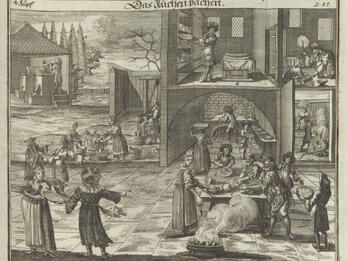Ḥemdat yamim (Choicest of Days): On the 15th of Shevat
Even though the fifteenth of the month of Shevat is during the period of shovevim,1 one does not fast, for it is the New Year’s Day for fruit trees. And with the tikkun [mystical repair] performed on that day for the fruits there is also a tikkun for the Righteous Eternal One, through the secret of that which is mentioned in the Zohar on Bereshit: “On the third day, the land produced fruit through the power of this Righteous One, as it is written: And God said, Let the earth bring forth grass, herb yielding seed, and a fruit tree [that produces fruit]. What is this fruit tree? This is the Tree of Knowledge of good and evil, which produces fruit that itself produces fruit: this is the Righteous, who is the Foundation of the world, etc.” [Zohar I:33a; Genesis 1:11]. And it is a good custom for the upright to eat much fruit on this day and to recite words of song and praise over them, as I instructed all of my friends who were with me. And although this does not appear in the words of the writings of the rabbi [Isaac Luria], may his memory be for life in the world to come, in any case, in my opinion, this custom is a wonderful tikkun, for both the revealed and the concealed realms. For behold, it is stated as follows in the Jerusalem Talmud, [Kiddushin] chapter four [48b]: “The humble shall hear of it, and be glad (Psalms 34:3). R. Ibun [sic] said: ‘In the future, one will have to give account of the fact that he saw all kinds of delicious foods but did not eat.’ R. Eleazar would limit this to tasting all kinds of new things.” And the meaning of the matter is that one who takes pleasure in the delights of this world without saying a blessing is called a robber [b. Berakhot 35b], since by way of blessing, one draws down the upper spiritual influences. And the ministering angel that rules over a certain fruit is filled with that influence and can grow the fruit again. Thus, he who takes pleasure without saying a blessing is a robber, for he ate food that was saturated with spirituality and he stopped and prevented that [divine] power from coming into the world. He should have drawn down the blessing from on high, but the power that rules over the food is now nullified and void of the influence that was in his hand. Accordingly, one who does not say a blessing is called a robber. It is also said that it is as though he robs his father and his mother, for he who eats with the properly intended blessing for foods repairs the divine sparks of his soul and of his father’s and his mother’s souls. This is in accordance with the esoteric meaning of the verse: I will take out of his mouth that which he has swallowed up (Jeremiah 51:44), in keeping with the verse: He has swallowed down riches, and he shall vomit them up again (Job 20:15). Thus, if one takes pleasure without saying a blessing, it is as though he is robbing his father and his mother of the sparks that belong to their souls; he is a companion of the Destroyer (Proverbs 28:24). This is because the raison d’être of the Destroyer is to rob the sparks and to absorb them, and not to return them to the holy realm. This is in accord with the esoteric meaning of the verse: For man does not live by bread alone, but by every word that proceeds out of the mouth of the Lord, etc. (Deuteronomy 8:3). This is the secret of the blessing, which brings out from impurity to holiness. [ . . . ]
And these punishments also apply to one who sees various kinds of fine fruits, and he lets them become dried up and bad, and he does not eat them. And he has withheld good from those to whom it is due [see Proverbs 3:27; i.e., the ministering angels], as he has not blessed over them. For this reason, the power that rules over those fruits is nullified and void of the upper influence that comes through the blessing. He also robs his father and his mother, for since he did not eat of the fruits, he did not bring out the sparks that belong to their souls, as already described. It is for this reason that R. Eleazar would limit the edible objects to all kinds of new fruits, in order to increase blessings and to make an immediate tikkun, and in order to avoid missing out on the commandment. For the sake of this tikkun, it is indeed suitable for us on this very day to eat all kinds of fruits and to recite blessings over them with proper intention, for a commandment performed at its proper time is beloved [by God]. And in the Zohar on the parashah of Shemot, it is written [Zohar II:15b]: “R. Judah said: why is it written, God has made the one opposite the other (Ecclesiastes 7:14), such as the firmament that the Holy One made opposite the world? Everything [below] alludes to that which is above. And when R. Aba would see one tree whose fruits would blossom and take on their form,2 he would cry and say: ‘If people only knew to what this alludes!’ etc.”
Notes
[Shovevim is an acronym for the first six Torah portions of the book of Exodus. Some kabbalists have a tradition of regular fasting during this period.—Trans.]
[Lit. “Whose fruit would become a bird that would fly from it.”—Trans.]
Credits
Published in: The Posen Library of Jewish Culture and Civilization, vol. 5.




